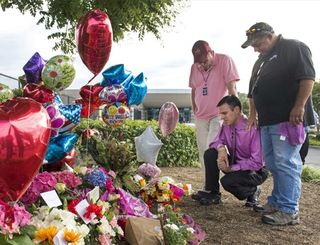'It Will Never Be Business as Usual Again' at WDBJ After Shootings

Six days removed from the murders of a reporter and cameraman by a former employee, “there’s a new normal” at WDBJ Roanoke, Va., says general manager Jeff Marks.
The station is back to producing regular features, newscasts and live shots. Schurz group VP Marci Burdick says there really isn’t anything WDBJ isn’t doing now. However, she cautions, “It will never be business as usual again.”
Burdick says WDBJ did not miss a newscast, as the staff continued its work on that day and after. “We watched them be absolutely stalwarts on camera, and bawl their eyes out after,” Burdick says. “The resilience of the team remains visible and amazing.”
WDBJ resumed live shots on Friday night, just two days after the shootings of Alison Parker and Adam Ward, which aired on live TV. Friday night was the kickoff to high school football season in Virginia, which Burdick says is “almost a national holiday” in DMA No. 66.
Marks says news director Kelly Zuber told the reporter in question that she didn’t have to do the live shot if she wasn’t comfortable. Her response was, “Let’s go. Let’s do it,” Marks says. “There’s great excitement on the part of the team to reach out to the community that has been so good to us.” WDBJ does that by covering live events, reporting and doing the news.
The station is taking some precautions with live shots, but Burdick did not wish to discuss them publicly, for obvious reasons.
They have had help from neighboring stations, rivals, retirees and alumni. With funerals and memorials Monday and Tuesday, a half dozen staff members from other Schurz stations were flown in to help cover and CBS leant them two photographers. They were also loaned a meteorologist from Richmond, and retired WDBJ anchor Keith Humphry returned to host the evening news Monday night.
Broadcasting & Cable Newsletter
The smarter way to stay on top of broadcasting and cable industry. Sign up below
The outreach nation-wide has “happily surprised” Marks. But by Wednesday, he says, they’ll mostly all be gone, and the WDBJ staff will be left to continue to pick up the pieces. Marks says he doesn’t want to “paint a rosy picture.” They have brought counselors and trauma experts to help the staff cope. “There’s a lot of recovery still to happen.”
“We keep telling people, ‘it’s a marathon, not a sprint,’” adds Burdick. “The staff will need time off on their own looking ahead.”
While the national attention has dwindled, now is the time for reflection, the “what we can learn from this stage,” as Marks calls it. They’re being asked to do thought pieces and instructional seminars, getting calls from syndicated shows and educational institutions.
“I’m still working on it,” Marks says. “I try to be as insightful as I can. My insight well has run a little dry now.”
His mind is also on mental health, proposing that it should receive as much research and awareness as cancer or heart disease. “Mental illness cannot rest on the periphery of the healthcare system,” he says,
His hope going forward is that news organizations continue to check government, find ways to improve communities and pursue the truth about mental health and other important issues.
“The message I want to make sure people hear immediately is: Do the news.”
